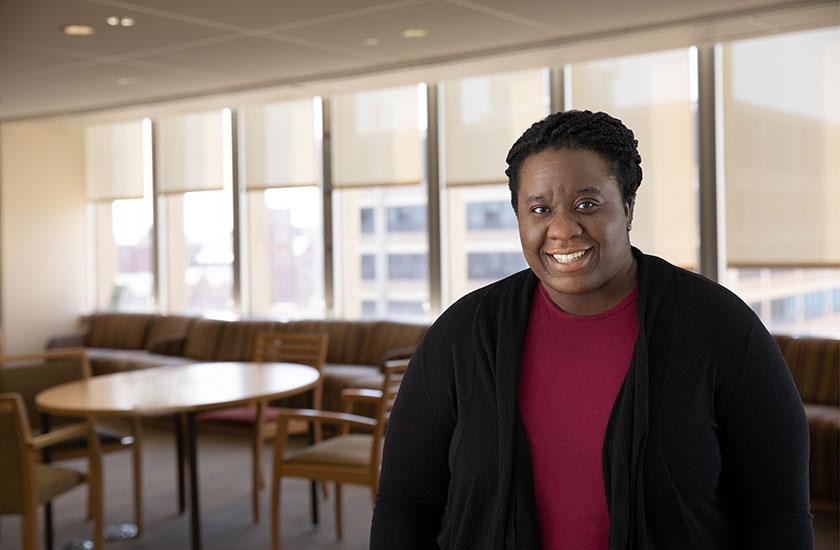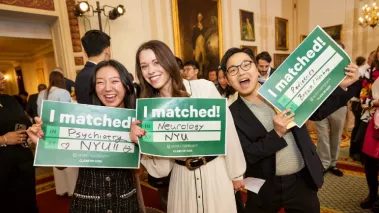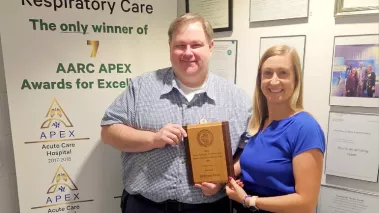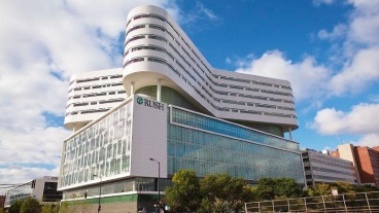Jennillee Wallace, MS ’12, PhD ’17, wasn’t entirely sure what to expect after moving from Jamaica to the U.S. to continue her education. Her leap of faith has certainly paid off, though, as she met friends and mentors who helped foster a path to a successful biomedical research career.
Wallace has found a home at Rush, earning two degrees at the Graduate College (now the Division of Translational Science) — a master’s in biotechnology and a PhD in immunology and microbiology — and joining the staff as a research scientist after graduating. In April she was recognized with an esteemed American Association of University Women research grant. She recently talked about her journey to Rush and how her career developed.
Tell us more about the award you recently received and how it relates to your work as a researcher.
Jennillee Wallace: The American Association of University Women’s research publication award is aimed toward women with a PhD in STEM who are not U.S. citizens and have an independent research project. AAUW’s goal is to empower women through educational and training awards in all disciplines. This particular award was a postdoctoral award to fund research for publication in a peer-reviewed journal.
The award is for a project I’m working on where I’ve identified a unique phenotype of immune cells. We'll be assessing whether this phenotype is neuroprotective or is contributing to inflammation in the context of HIV-associated neurocognitive disorders.
Congratulations! Tell us about your background and how you got to this position.
JW: I was born and raised in Jamaica and then came to the U.S. to attend college. I graduated from Lake Forest College in Illinois, where I majored in biology as an undergraduate. As an international student, I received an optional practical training permit to work in the field I majored in. For my first job, I worked part-time in a cosmetic chemistry lab and shortly after started a full-time position in a general chemistry lab. After two years of working, I went back to school and enrolled in the Biotechnology master’s program at Rush.
I remained at Rush and went on to graduate in 2017 with a PhD in immunology and microbiology, which was the precursor to Rush’s current Integrated Biomedical Sciences PhD program. Then I stayed at Rush as a research scientist in the laboratory of Dr. Lena Al-Harthi, where we focus on neuro HIV research.
Why did you decide to pursue a career as a researcher?
JW: My interest in research has pretty much always been there. Even in high school, I started going down that track very early. I’ve always been good at it and enjoy it, so it seemed like a natural path to take. So when I went to college I was already set on pursuing science and research.
What drew you to Rush for your education?
JW: The Biotechnology master’s program is very versatile. I was seriously considering a career in research but also wanted to leave my options open as I pursued a career in health care or research in medicine. The Biotechnology program, which was directed by Dr. Gabriella Cs-Szabo, really prepares you for many different opportunities for research in medicine.
How did your education at Rush help position you for a strong start to your career?
JW: The mentorship I received was so important. At the Biotechnology program, Dr. Cs-Szabo took genuine interest in helping us carve out our career paths. Now, under Department of Microbial Pathogens and Immunity chairperson Dr. Lena Al-Harthi, my work with other investigators both at Rush and outside of Rush has been instrumental. In the Immunology-Microbiology PhD program there were many seminars, journal clubs and other opportunities to discuss leading-edge research. We had opportunities to attend conferences and present our research, and learn about work from others in the field.
We were also able to collaborate with people in different departments at Rush as well as people outside Rush. People were very open to sharing ideas across disciplines.
Now that you have some solid work experience, what advice would you give to students considering a career in research?
JW: First and foremost, make sure you find strong mentorship. Someone who understands your personality and uses that understanding to help you tap into your full potential. That person is going to be a big part of how your education and work career play out. Also, I would recommend finding a project that allows you to learn as much as possible, is challenging enough to hone your critical thinking skills and has the potential to give you some independence as well.







